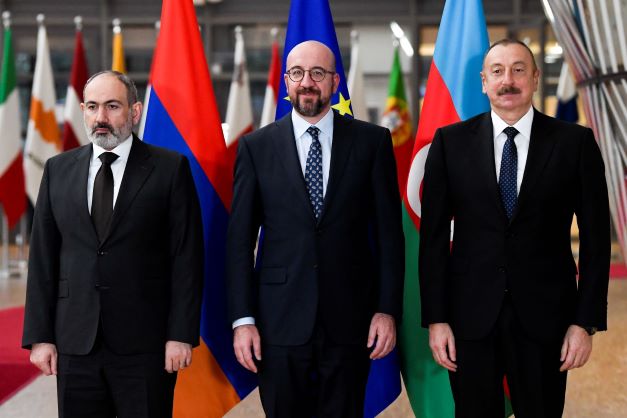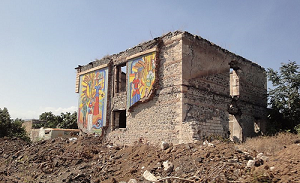Karabakh Armenians Threaten to "Join Russia" as Armenia Turns Toward Peace with Azerbaijan
By Robert M. Cutler
May 9, 2022
Constructive developments in negotiations for peace between Armenia and Azerbaijan, particularly those mediated by the European Union, have produced a further radicalization of the opponents of such a peace. Russia is unhappy with EU and Western attempts to take the initiative for the peaceful normalization of relations between Azerbaijan and Armenia. Russia is seeking to use the Karabakh Armenians to maintain its geopolitical position in the South Caucasus. Threats have been voiced, in both Moscow and Khankendi [Stepanakert], of the intention to seek an annexation to Russia of areas in Nagorno-Karabakh where Russian troops are located.

A Year After The “Four-Day War”, Guns Continue to Speak Louder than Diplomats in Nagorno-Karabakh
By Azad Garibov
April 21, 2017, the CACI Analyst
One year has passed since the “Four-Day War” – an unprecedented escalation of the Nagorno-Karabakh conflict on April 1-5, 2016 that claimed the lives of over a hundred soldiers on both sides. The conflict over Nagorno-Karabakh has never been truly frozen, yet the increased intensity of clashes since April 2016 demonstrates that violence can flare up at any time, destabilizing the already fragile region. As no peaceful solution is visible on the horizon, the Line of Contact (LoC) between Azerbaijan’s and Armenia’s armed forces has become the most militarized area of the former Soviet Union. Azerbaijani and Armenian societies have also grown increasingly nationalistic as fighting intensifies and casualty rates grow on the frontline.

Karakbakh negotiations on hold as Armenia gears up for parliamentary elections
By Armen Grigoryan
January 12th, 2017, The CACI Analyst
Further negotiations on the Nagorno-Karabakh issue seem to be practically postponed until Armenia completes its parliamentary elections in April 2017. At the same time, the government demonstrates an unwillingness to proceed beyond rhetoric with governance and economic reforms. The administration’s inability to deliver satisfactory economic results and ensure social development, as well as its close connections with Russia with a strong clientelism component, suggest a further growth of dependence and compliance with Moscow’s political agenda.
New tracks for Nagorno-Karabakh conflict resolution: separate tasks, complementary missions for Russia and the OSCE Minsk Group?
By Zaur Shiriyev
September 12th, 2016, The CACI Analyst
In the wake of the St. Petersburg meeting, it has become clear that two, distinct peace processes are in play. The OSCE Minsk Group is creating a technical conflict prevention mechanism, while Russia is leading a conflict resolution process. However, while they may appear distinct – and therefore potentially conflicting – these parallel tracks are complementary.
A “historic” moment in the Nagorno-Karabakh conflict?
By Elman Gafarov
July 29th, 2016, The CACI Analyst
2016 has become the year of most active peace talks on Nagorno-Karabakh conflict since its cease-fire in 1994. The reason is the deadly April clashes between the warring sides and the “wake-up” call to all mediators that the conflict can get out of control and cause serious damage to the regional security and stability in South Caucasus. Russia is particularly seen to be worried about this trend. Therefore, the high-level talks are held in an effort to change the status-quo on the ground and end the occupation of Azerbaijani territories. The positive trend can be nevertheless be derailed due to social and political unrest in Yerevan.







